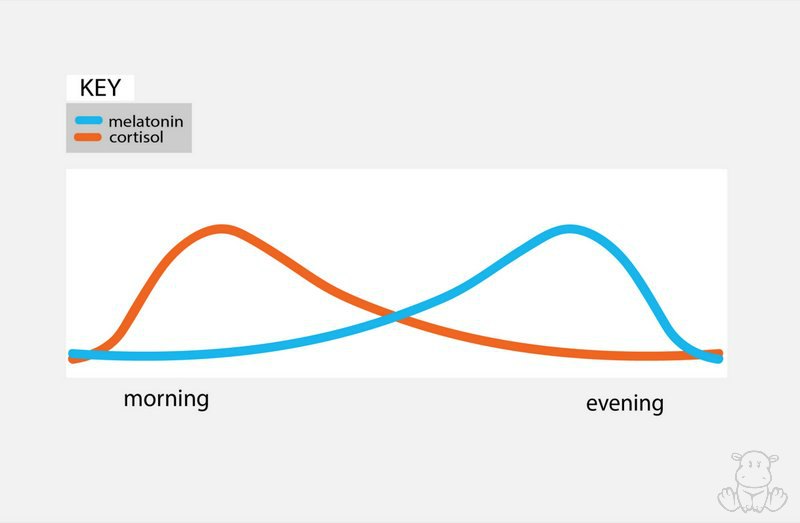Inside: The benefits and uses of melatonin. Plus, is melatonin safe for kids?
As someone who has lost a decent amount of zzzz’s to sleeping baby ninjas and early rising toddlers, I’ve dedicated a significant amount of time to researching and testing ways to improve sleep. Studies show that deep, good quality sleep makes us smarter, more creative, happier, more productive, and even keeps us looking younger . . . pretty important stuff! (1) (2) (3) (4 ) (5) (6)
Unfortunately, according to a recent Centers for Disease Control and Prevention study, one out of three Americans “are not getting enough sleep on a regular basis.” Kids are affected, too, although the symptoms of inadequate sleep often look different children.
A lack of sleep can result in ADHD-like symptoms in kids,” says Dr. David Rapoport, director of the NYU Sleep Disorders Program.
“Kids don’t react the same way to sleep deprivation as adults do,” he told Health.com. “Whereas adults get sleepy, kids tend to get hyperactive.” (7)
For many families, melatonin supplements are taken as an alternative to addictive benzodiazepine-based sleeping pills, which have been shown to actually reduce the amount of deep, restorative sleep you get. Benzodiazepine sleeping pills also been shown to impair alertness, coordination and cognition during the day, which is not exactly what most people are hoping for when they take something in hopes of getting a good night’s sleep. (8, 9)
I’m often asked why melatonin supplements are not suggested in my article on sleep tips for kids and other articles, so today we’re going to dive into:
- Does melatonin work? (Research says yes, but only for certain situations)
- Is melatonin safe for kids? (One expert calls it’s use with children “rather alarming,” – we’ll dive into why)
What is melatonin?
Like estrogen and testosterone, melatonin (N-acetyl-5-methoxytryptamine) is a powerful hormone – the only one that can be legally obtained without a prescription in the United States. In many parts of the world, including Australia, New Zealand and many European countries, melatonin is only available via prescription.
Often called the sleep hormone, melatonin has a partner in the body – cortisol. When one goes up, the other goes down, like this:

Here’s how it’s supposed to work: Cortisol, aka the “stress hormone,” rises in the early morning to motivate us to get up and go. As I wrote about here, some stress is actually beneficial, but getting stuck in stress mode is not.
Anyway, after its early morning spike, cortisol tapers off throughout the day. As it falls, melatonin starts to rise, signaling to our bodies that it’s time to relax and unwind. Melatonin increases significantly after the sun goes down and peaks overnight before tapering off in the early morning hours. At that point, cortisol takes back the reigns and starts preparing us for the new day. This cycle is known as our circadian rhythm.
At least, that’s how it’s SUPPOSED to work. Factors like stress, excessive caffeine intake, exposure to blue light at night, not getting enough natural light during the day, and alcohol consumption can all reduce our internal production of melatonin. When that happens, some people take melatonin as an over-the-counter dietary supplement before bed.
To recap, there actually two types of melatonin:
- The type our bodies produce internally – This is called endogenous melatonin. Endogenous literally means “growing or originating from within an organism.”
- The supplements found on store shelves – Also called exogenous melatonin. Exogenous means “growing or originating from outside an organism.”
What are the benefits of melatonin?
In addition to signaling when it’s time to sleep, melatonin:
- Regulates immune function (10)
- Supports cardiovascular health (11)
- Is produced in the gut as well as the brain, where it may help regulate a unique, gut-specific circadian rhythm (12)
So, does melatonin work for sleep?
According to “The Sleep Doctor” Michael J. Breus:
This is the really important thing you should understand about melatonin: melatonin is a sleep and body clock regulator NOT a sleep initiator. Melatonin works with your biological clock by telling your brain when it is time to sleep. Melatonin does not increase your sleep drive or need for sleep.” (13)
In other words, melatonin is not really a “sleep hormone.” It signals to our bodies when it’s time to rest and unwind, which can be helpful if our circadian rhythm has gotten out of sync somehow. Examples of when this might happen are:
- Traveling to a different time zone, where our body has not adjusted to local time
- Forgetting to wear blue light blocking glasses when watching a movie before bed (and therefore accidentally suppressing normal melatonin production)
When circadian rhythm has been impacted, many experts believe short-term use of melatonin can be helpful. According to the National Center for Complementary and Integrative Health:
Studies suggest that melatonin may help with certain sleep disorders, such as jet lag, delayed sleep phase disorder (a disruption of the body’s biological clock in which a person’s sleep-wake timing cycle is delayed by 3 to 6 hours), sleep problems related to shift work, and some sleep disorders in children. It’s also been shown to be helpful for a sleep disorder that causes changes in blind peoples’ sleep and wake times. Study results are mixed on whether melatonin is effective for insomnia in adults, but some studies suggest it may slightly reduce the time it takes to fall asleep.”
However, when we look deeper things are more nuanced. According to Breus,
Melatonin in pill form does not function like your body’s naturally produced melatonin: it affects the brain in bursts and rapidly leaves the system, instead of the slow build up and slow wash-out that your body’s naturally produced melatonin experiences.” (13)
For some people, this may mean that the melatonin washes out too quickly, possibly leading to night waking. Some melatonin supplements do have time release formulas, though, which may facilitate a slower wash-out.
Is melatonin safe?
The thing that surprised me most when I first started researching melatonin supplements is how common high doses are. Just 1-3 mg of melatonin can elevate blood melatonin levels from 1 – 20 times normal levels, but you’ll find melatonin supplement that contain up to 60 mg. (14)
The optimal dose identified by MIT researchers is much lower – 0.3 mg. (15) Other studies have found that higher doses may actually be less effective.
Research points to potential downsides with higher doses. We’ll discuss those below, along with considerations for long-term use, what I do when I take melatonin, and how to increase levels naturally.
With that in mind, here are the three things to consider when talking through options with your trusted healthcare provider. We’ll dive deeper in melatonin safety for kids, too.
#1: Long-Term Melatonin Supplementation May Cause Rebound Insomnia
When it comes to glands that produce hormones, the old “use it or lose it” adage has definitely turned out to be true. By now I’m sure you’ve heard that anabolic steroids – which mimic testosterone – cause testicles to shrink.
That’s because every hormonal system in the body has a feedback loop. When testosterone levels start to drop, the brain sends a signal to the testes in the form of luteinizing hormone (LH) and follicle-stimulating hormone (FSH), telling them to make testosterone and sperm.
However, if you give a person high dose exogenous testosterone (in the form of steroids), the brain thinks, “Hey, we’re all good here! No need to make testosterone.” The brain stops sending signals to the testes, and over time they atrophy from lack of use. This is called a negative feedback loop. Here’s one way to think about it:
It’s kind of like if you had to walk to work every day to make money, but all of a sudden you win the lottery and never have to leave your couch. You still have just as much money, but your muscles will atrophy from lack of use.” (16)
The pineal gland – which produces melatonin – is thought to function in a similar way. According to Michael Grander, a sleep researcher at the University of Pennsylvania, when you take melatonin for an extended period of time, “your body may acclimate and re-adjust and produce less over time which will work against you.” (17) That may be one reason why most melatonin supplements come with a warning not to use them more than 2-3 weeks.
What is rebound insomnia?
In addition to lowering natural production, long-term supplementation may have another effect called rebound insomnia. According to Dr. Richard Wurtzman, the MIT scientist who discovered that melatonin is tied to sleep, supplementing may help at first, but eventually:
you’ll stop responding because you desensitize the brain. And as a consequence, not only won’t you respond to the stuff you take…you won’t respond to the stuff you make, so it can actually promote insomnia after a period of time.” (17)
Drugs.com mentions the possibility of this effect at doses between 2 and 10 mg. (18)
#2: Melatonin Supplements May Affect Fertility
Melatonin doesn’t just help set our circadian rhythm – it also helps govern reproductive function. In fact, in Europe high doses of melatonin have been used as a contraceptive. (19) The dose used was 75 mg, which is just 15 mg higher than what can be bought over-the-counter in the United States. When you consider that weight is often factored in when determining dosage, it makes you wonder if lower dosages could have a similar effect in some people.
#3: Other Possible Side Effects
Before we go over this list, keep in mind that many melatonin supplements raise levels far beyond what our bodies can achieve naturally. Many experts caution against high dosages because of the increased likelihood of negative effects. Long-term use is another factor that needs to be considered, as it may be appropriate in some circumstances and not others.
According to the Mayo Clinic, potential side effects of melatonin supplements include:
- daytime sleepiness
- dizziness
- headaches
- abdominal pain
- mild anxiety
- irritability
- confusion
- feelings of depression. (20)
Additional research suggests other possible effects, such as:
- Altered thyroid hormone uptake – In rats, high melatonin levels have also been shown to decrease T3 & T4 (thyroid hormone) uptake. (21)
- Breast enlargement (gynecomastia) in men, possibly by stimulating the overproduction of the hormone prolactin (22)
- Reduced sperm count in men (23)
Melatonin has also been shown to interact with many medications. Here’s a list.

Is melatonin safe for kids?
Though it now comes in cherry flavored chewable capsules, melatonin is not recommended for children by the Mayo Clinic. It “plays a role in the way a person’s body matures sexually,” writes the clinic, noting that melatonin “levels have an impact on how the ovaries and testes function. Further study is needed to determine if taking melatonin during childhood or the teen years can have an impact on a person’s sexual development.”
According to David Kennaway, director of the circadian physiology lab at the University of Adelaide in Australia, it’s not just reproductive development that needs to be considered.
There “is extensive evidence from laboratory studies that melatonin causes changes in multiple physiological systems, including cardiovascular, immune and metabolic systems” in animals, he says, and he calls its use with children “rather alarming.” (24)
In other words, we’re not sure yet how giving melatonin supplements to children, particularly when used long-term, might affect their development. Other research suggests that supplementing with 1-5 mg of melatonin may cause seizures in children. (25)
That said, there may be times when a doctor determines that the benefits of supplemental melatonin outweighs the risks. According to Marcia Buck, clinical pharmacy specialist at the University of Virginia Children’s Hospital in Charlottesville, melatonin is most beneficial for children who have suffered brain injuries that impair melatonin production. (26)
Other research has concluded that melatonin may improve sleep in children with autism. (27) Some of the children in this analysis had gene abnormalities that affected melatonin production and/or the function of melatonin receptor sites within the body. (Melatonin receptor sites are docking stations that allow the body to grab onto and use the melatonin it makes.)
Melatonin for Jet Lag
“Melatonin can help reduce jet lag by syncing your internal clock with the time change.” (28)
Personally, the times I’ve found melatonin most helpful is when traveling through time zones. Here’s the method I used:
- “Eastbound: If you are traveling east, say from the US to Europe, take melatonin after dark, 30 minutes before bedtime in the new time zone or if you are on the plane. Then take it for the next 4 nights in the new time zone, after dark, 30 minutes before bedtime. If you are still feeling drowsy the day after using this medication, try a lower dose.
- Westbound: If you are heading west, for example, from the US to Australia, a dose is not needed for your first travel night, but you then may take it for the next 4 nights in the new time zone, after dark, 30 minutes before bedtime. Melatonin may not always be needed for westbound travel.” (18)
This analysis found that a low dose (0.5 mg) and a high dose (5 mg) were similarly effective.
Want to get your circadian rhythm back on track naturally?
You’ll find 18 science-backed tips here and more that specifically relate to children here.
Frequently Asked Questions
Can you take melatonin while pregnant or nursing?
The safety of melatonin supplementation during pregnancy has not been studied. We do know, however, that melatonin is transferred into breast milk. (29)
Does melatonin interact with alcohol?
Yes. Alcohol may weaken or amplify the effects of supplemental melatonin. (30)
This article was medically reviewed by Dr. Anna Cabeca, a gynecologist and obstetrician and a menopause and sexual health expert. As always, this is not personal medical advice and we recommend that you talk with your doctor.
Sources:
1. Scientific American (2008) Sleep On It: How Snoozing Makes You Smarter. Retrieved from https://ift.tt/32yFOuG
2. PBS (2012) Can Sleep Make You Smarter? Retrieved from https://ift.tt/2O59JaC
3. BBC (2013) How Sleep Makes Your Mind More Creative. Retrieved from https://ift.tt/1aF3kT7
4. American Psychological Association (2014) More Sleep Would Make Most Americans Happier, Healthier and Safer. Retrieved from https://ift.tt/2O42xM1
5. Stump, Scott (2013) “Nap Rooms” Encourage Sleeping On The Job To Boost Productivity. Retrieved from https://ift.tt/32zcfZL
6. Harris, Shelby (2013) Sleep and Longevity: 5 Ways Sleep Keeps You Young. Retrieved from https://ift.tt/2O4Bmk3
7. Sparacino, Alyssa (2019) 11 Surprising Health Benefits of Sleep. Retrieved from https://ift.tt/32yFSuq
8. Roehrs, Timothy and Roth, Thomas (2010) Drug-Related Sleep Changes: Functional Significance and Clinical Relevance. Retrieved from https://ift.tt/2OceteO
9. Stewart, SA (2005) The Effects of Benzodiazepines On Cognition. Retrieved from https://ift.tt/2moev16
10. Carrilo-Vico, Antonio et. al. (2013) Melatonin: Buffering The Immune System. Retrieved from https://ift.tt/2O2ix0O
11. Zukiswa, Jiki et. al. (2018) Cardiovascular Benefits of Dietary Melatonin: A Myth or a Reality? Retrieved from https://ift.tt/2sQCsCV
12. Mukherjee, Sourav and Maitra, Saumen Kumar (2015) Gut Melatonin In Vertebrates: Chronobiology and Physiology. Retrieved from https://ift.tt/2O0wtsg
13. Breus, Michael J. (2011) Melatonin: Not a Magic Bullet for Sleep. Retrieved from https://ift.tt/32yFT1s
14. National Sleep Foundation. Melatonin and Sleep. Retrieved from https://ift.tt/2O3dvRU
15. MIT News (2001) Scientist Pinpoint Dosage of Melatonin for Insomnia. Retrieved from https://ift.tt/1R3ecUm
16. How Do Steroids Lead To Testicular Atrophy? Retrieved from https://ift.tt/2O1ae5r
17. Huffington Post. The Dark Side of Melatonin. Retrieved from https://ift.tt/32yFUm2
18. Drugs.com. Melatonin. Retrieved from https://ift.tt/2mRLs6C
19. Silman, RE (1993) Melatonin: A Contraceptive for the Nineties. Retrieved from https://ift.tt/32ATO72
20. Mayo Clinic (2017) Is melatonin a helpful sleep aid — and what should I know about melatonin side effects? Retrieved from https://ift.tt/2NYKrea
21. Rom-Bugoslavskaia, ES and Shcherbakova VS (1986) Seasonal Characteristics of the Effect of Melatonin on Thyroid Function. Retrieved from https://ift.tt/32yFX1c
22. Anawalt, Bradley (2016) Gynecomastia. Retrieved from https://ift.tt/2O01a0L
23. Luboshitzky, Rafael et. al. (2002) Melatonin Administration Alters Semen Quality in Health Men. Retrieved from https://ift.tt/32yFY5g
24. Science Daily (2015) Warning On Use of Children’s Drug for Children’s Sleep. Retrieved from https://ift.tt/1R3eb2O
25. Penn State. Melatonin. Retrieved from https://ift.tt/32yG0do
26. USA Today (2008) Kids Tucked in With a Dose of Melatonin. Retrieved from https://ift.tt/2O60Q0o
27. Rossignol, DA and Frye, RE (2011) Melatonin in autism spectrum disorders: a systematic review and meta-analysis. Retrieved from https://ift.tt/32yG3pA
28. Pfeffer, M et. al. (2012) The endogenous melatonin (MT) signal facilitates reentrainment of the circadian system to light-induced phase advances by acting upon MT2 receptors. Retrieved from https://ift.tt/2O2FBNf
29. Cohen, Engler et. al. (2012) Breastfeeding may improve nocturnal sleep and reduce infantile colic: potential role of breast milk melatonin. Retrieved from https://ift.tt/32wstmy
30. Medical News Today (2017) Are Melatonin And Alcohol Safe To Mix? Retrieved from https://ift.tt/2xAukKp
Continue reading Melatonin for Sleep: Does It Work & Is It Safe for Kids?...
from Mommypotamus https://ift.tt/32AgLY8




No comments: